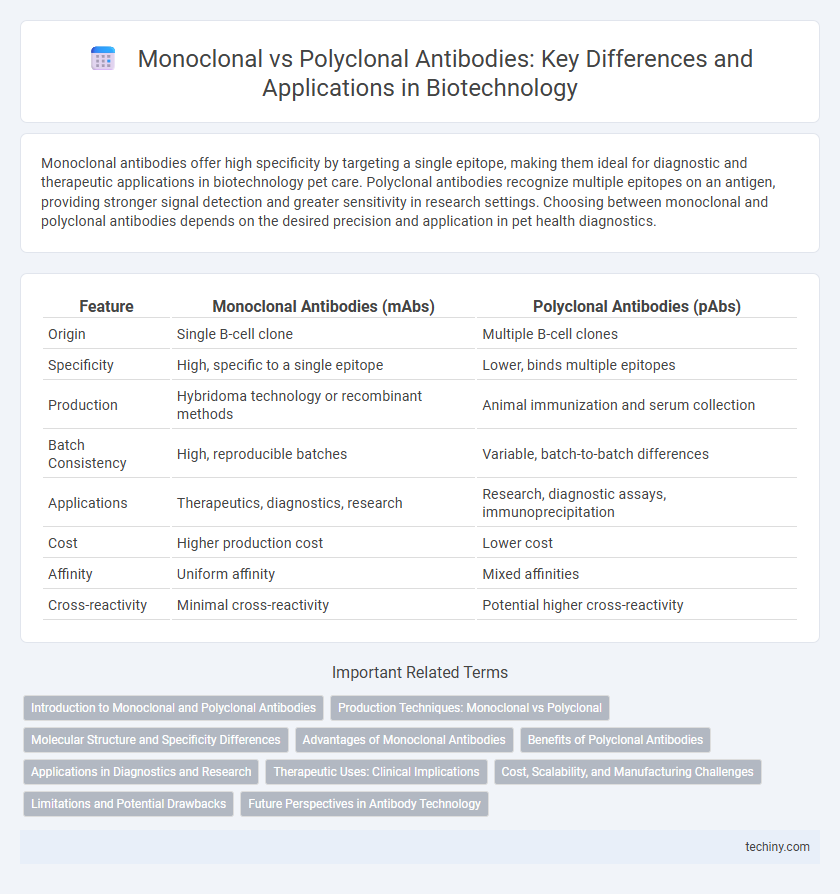Monoclonal antibodies offer high specificity by targeting a single epitope, making them ideal for diagnostic and therapeutic applications in biotechnology pet care. Polyclonal antibodies recognize multiple epitopes on an antigen, providing stronger signal detection and greater sensitivity in research settings. Choosing between monoclonal and polyclonal antibodies depends on the desired precision and application in pet health diagnostics.
Table of Comparison
| Feature | Monoclonal Antibodies (mAbs) | Polyclonal Antibodies (pAbs) |
|---|---|---|
| Origin | Single B-cell clone | Multiple B-cell clones |
| Specificity | High, specific to a single epitope | Lower, binds multiple epitopes |
| Production | Hybridoma technology or recombinant methods | Animal immunization and serum collection |
| Batch Consistency | High, reproducible batches | Variable, batch-to-batch differences |
| Applications | Therapeutics, diagnostics, research | Research, diagnostic assays, immunoprecipitation |
| Cost | Higher production cost | Lower cost |
| Affinity | Uniform affinity | Mixed affinities |
| Cross-reactivity | Minimal cross-reactivity | Potential higher cross-reactivity |
Introduction to Monoclonal and Polyclonal Antibodies
Monoclonal antibodies are identical immune proteins produced by a single clone of B cells, targeting a specific epitope with high specificity and uniformity. Polyclonal antibodies consist of a mixture of immune proteins derived from multiple B cell clones, recognizing multiple epitopes on the same antigen, resulting in greater sensitivity but less specificity. Monoclonal antibodies are widely used in diagnostic assays, targeted therapeutics, and research due to their reproducibility, while polyclonal antibodies are favored for detecting complex antigens and immune response analysis.
Production Techniques: Monoclonal vs Polyclonal
Monoclonal antibodies are produced through hybridoma technology, where a single B-cell is fused with a myeloma cell to create a clone that secretes identical antibodies targeting a specific epitope. Polyclonal antibodies are generated by immunizing an animal and harvesting the serum, resulting in a heterogeneous mixture of antibodies that recognize multiple epitopes on the same antigen. Hybridoma-based monoclonal production provides high specificity and consistency, whereas polyclonal production offers broader antigen recognition but with batch-to-batch variability.
Molecular Structure and Specificity Differences
Monoclonal antibodies consist of identical immunoglobulin molecules that recognize a single epitope on an antigen, providing high specificity and uniform molecular structure. Polyclonal antibodies are a heterogeneous mixture of immunoglobulins targeting multiple epitopes, resulting in varied molecular structures and broader antigen recognition. The uniformity of monoclonal antibodies allows for consistent binding affinity, while polyclonal antibodies offer enhanced sensitivity due to their multi-epitope targeting capability.
Advantages of Monoclonal Antibodies
Monoclonal antibodies offer high specificity by targeting a single epitope, reducing cross-reactivity and increasing accuracy in diagnostic and therapeutic applications. Their consistent production ensures batch-to-batch uniformity, which is crucial for reproducibility in clinical treatments and research assays. These antibodies provide enhanced targeting precision, making them ideal for use in personalized medicine and cancer immunotherapy.
Benefits of Polyclonal Antibodies
Polyclonal antibodies offer increased sensitivity and stronger signal detection by recognizing multiple epitopes on a single antigen, making them ideal for detecting low-abundance proteins. Their production is faster and more cost-effective compared to monoclonal antibodies, allowing for more rapid experimental turnaround. Polyclonal antibodies also provide greater tolerance to antigen variations and denaturation, enhancing their usability in diverse assay conditions.
Applications in Diagnostics and Research
Monoclonal antibodies provide high specificity for target antigens, making them ideal for diagnostics such as ELISA, flow cytometry, and immunohistochemistry, where consistent and reproducible results are crucial. Polyclonal antibodies recognize multiple epitopes, offering enhanced sensitivity and robust detection in applications like Western blotting and immunoprecipitation, especially useful for identifying low-abundance proteins. Both antibody types are indispensable in research and clinical diagnostics, with monoclonals favored for precision and polyclonals for comprehensive antigen recognition.
Therapeutic Uses: Clinical Implications
Monoclonal antibodies provide targeted therapy with high specificity against single epitopes, making them effective for treating cancers, autoimmune diseases, and infectious diseases with reduced off-target effects. Polyclonal antibodies, derived from multiple B-cell clones, offer broader epitope recognition and are valuable for infectious disease treatments where antigen variability occurs but may increase the risk of cross-reactivity and adverse immune responses. Clinical applications favor monoclonal antibodies for precision medicine approaches, while polyclonal antibodies remain useful in passive immunization and diagnostic contexts.
Cost, Scalability, and Manufacturing Challenges
Monoclonal antibodies generally involve higher production costs due to complex cell culture techniques and stringent purification processes, whereas polyclonal antibodies are cheaper to produce by immunizing animals. Scalability favors monoclonal antibodies as their production can be standardized in bioreactors, ensuring consistent batch quality, while polyclonal antibody yields may vary with biological sources. Manufacturing challenges for monoclonal antibodies include maintaining cell line stability and avoiding contamination, whereas polyclonal antibody production faces variability in antibody specificity and limited supply from individual animals.
Limitations and Potential Drawbacks
Monoclonal antibodies exhibit high specificity but can be limited by their narrow epitope recognition, reducing effectiveness against antigen variants or mutations. Polyclonal antibodies provide broader detection due to multiple epitope targeting but face challenges such as batch-to-batch variability and potential cross-reactivity, which compromise assay consistency. Both types may induce immunogenic responses and require careful consideration of stability and production scalability in therapeutic applications.
Future Perspectives in Antibody Technology
Monoclonal antibodies are poised to dominate future therapeutic landscapes due to their high specificity, reproducibility, and ease of large-scale production, enabling targeted treatments for complex diseases like cancer and autoimmune disorders. Advances in antibody engineering, such as bispecific antibodies and antibody-drug conjugates, further enhance the functional versatility and clinical efficacy of monoclonal antibodies. Polyclonal antibodies, while providing broad epitope recognition beneficial for diagnostic applications, are likely to remain complementary tools alongside monoclonal technologies in research and immunotherapy development.
**Monoclonal antibodies vs Polyclonal antibodies** Infographic

 techiny.com
techiny.com